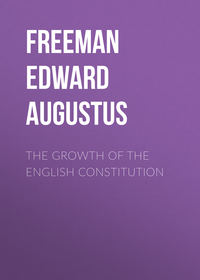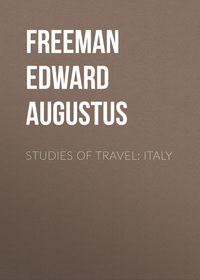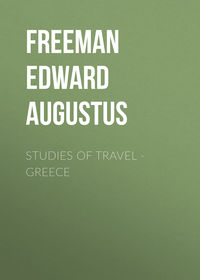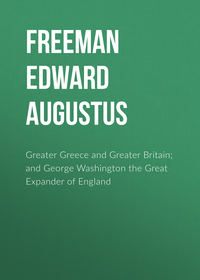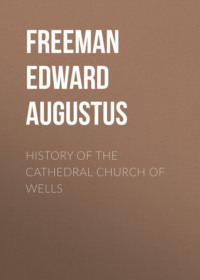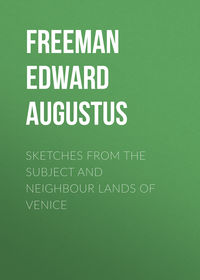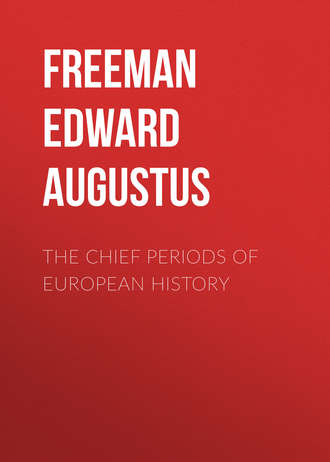 полная версия
полная версияThe Chief Periods of European History
The conquests of Cæsar then, by making the Roman and the German neighbours, neighbours whose presence could not fail to work the deepest impress on each other, opened one side of later history. The world that then was, the world of Roman dominion tempered by Greek influences, had now nations beside it which were neither subjects nor as yet rivals, nations whose mingling with that elder world, in many forms and at many stages, was to call into being the world in which we live. But the Roman and Teutonic elements out of which the world of modern Europe and European colonies was to be formed, were not the Roman and the Teuton in the first state in which history shows them. Their fusion did not come till both had been brought under a common influence. And that was an influence whose birthplace carries us back again from the conquests of Cæsar to the conquests of Pompeius, from the conquests of Pompeius to an earlier stage of the Seleukid power. When that power was weakened on the great day of Magnêsia, its weakness was not merely to open the way for the advance of Parthia from the East. Native powers, held down under Persian and Macedonian supremacy, sprang into new life. The greatest of existing Semitic powers had been humbled; it was soon to be wiped out; but the abiding life of the Semitic race showed itself in new shapes, in one shape that was doomed to be more abiding than the power of Sidon and Carthage. That shape of Semitic influence was to intertwine itself so closely with the power of Rome that the two could never more be rent asunder. Arab lords of Damascus gave a foretaste of the days when mightier Arab lords of Damascus should reign from the Indus to the Ocean. Hebrew lords of Jerusalem called up the memory of the days when mightier Hebrew lords of Jerusalem had reigned from the river to the Great Sea westward. Hannibal might die in banishment; his city might become heaps like older Nineveh; but men speaking the tongue of Hannibal, though they worshipped not the gods of Hannibal, were, from the day when the holy zeal of Mattathias struck down the renegade, to form one of the great moving powers in all future history. If the Greek was to enlighten the world, if the Roman was to rule the world, if the Teuton was to be the common disciple and missionary of both, it was from the Hebrew that all were to learn the things that belong to another world. In the highest teaching of all, Roman and Goth had to become the disciples of the Jew, but of the Jew speaking only by the mouth of a Greek interpreter. Before the Aryan world of Europe could truly do its work, it had to take to itself a Semitic creed. It had to take to itself that Semitic creed so fully, so exclusively, as to make it by adoption the creed of Europe, to make it before all things the creed of Rome. For the last twelve hundred years the Eternal Question has taken the shape of an abiding strife between two creeds alike of Semitic birth. But of those two creeds one has become Aryan by adoption; the younger races accepted the gift which the elder cast aside; as the birthright of Edom passed to Israel, so the birthright of Israel passed to be the common heritage of the Greek, the Roman, and the Teuton. Rome is not Rome in all her fulness, she has not risen to the true height of her mission in the world, she is not fully mistress and teacher of the nations, till she has cast aside her old gods and has bowed to the spiritual mastery of a despised sect from a despised corner of her dominion. The miracle of miracles, greater than dried-up seas and cloven rocks, greater than the dead rising again to life, was when the Augustus on his throne, Pontiff of the gods of Rome, himself a god to the subjects of Rome, bent himself to become the worshipper of a crucified provincial of his Empire. The conversion of our own folk, the conversion of any other barbarian folk of Europe, was no marvel. Where Rome led, all must follow, Celt, Teuton, Slave, each in his turn. That Christianity should become the religion of the Roman Empire is the miracle of history; but that it did so become is the leading fact of all history from that day onwards. Explain the fact as we will, Christianity is the religion of the Roman Empire, and it is hardly more. It has been accepted by every land which either became part of the Empire or came under its influence; that is, it has become the creed of Europe and European colonies. Beyond those limits it has made conquests, but they have seldom been abiding; such cases as Abyssinia are exceptional, and after all they come of Roman influence more widely spread than usual. Christianity has never been the creed of any great power beyond the European world. The great nations of Asia and Africa have either kept their ancient heathendom or have become more distinctly antagonistic to the faith of Rome by embracing the faith of Arabia. On the other hand, no nation within the Roman pale can be said to have fallen away from Christendom. The folk of Christian lands have been enslaved or swept away; renegades have been many; whole tribes, as in Albania, have become apostates, but whole nations never. It would have sounded strange in the ears of Nero or of Trajan to be told that a day would come when the rule of Rome could be spoken of as the joint “rule of Christ and Cæsar;” to be told that their successors should be admitted to their office by rites borrowed from the sacred books of the Hebrew, at the hands of the chief of the sect whose votaries they sent to the lions or to the coat of fire. It was in a very deep and living sense that the words were fulfilled which said that the kingdoms of the world had become the kingdoms of our Lord and of His Christ. But their highest fulfilment of all was when the Empire of the Cæsar came to rejoice in its Christian style of Holy; when the Emperor, Advocate of the Universal Church, deemed it a further honour to wear the garb and to share in the office of Christian priesthood; when Dante gave his genius to show that the growth of the Roman power was the special work of God, and that the head of the Roman power was, in all things earthly, God’s immediate Vicar upon earth. A theory, it may be said, which no age saw in practice. Truly so, and chiefly because the power of Rome split asunder, because the inheritance of her Cæsar was disputed between a prince by the Bosporos and a prince by the Rhine. Those days are still far from us; we shall reach them in the course of our story; it is enough here to say that the very cleaving to Roman titles and traditions on the part of powers from which all that was truly Roman had passed away was in truth the most speaking witness to the deep and lasting impress on men’s minds which had been won for the teaching that it was for Rome, and for Rome alone, to rule and judge the nations.
The change from the commonwealth to the Empire of Rome was in truth a gradual process by which a single citizen of Rome, charged with a special commission, allowed to unite offices and powers which were designed to act as checks on one another, changed, step by step, first into a practical, and then into an acknowledged, master of Rome and of all that obeyed Rome. That change, so strikingly analogous to the gradual process by which Rome herself changed from influence to dominion, is, in our œcumenical survey, of far less direct moment than it is in the constitutional history of Rome herself. We have to deal with the œcumenical headship of Rome, whatever form the government of Rome herself may take. But the indirect œcumenical results of the change from commonwealth to Empire were vast indeed. To the Roman city the change was political death; to the provinces it was the beginning of a new life. Under the Empire, not only were many practical grievances lessened in the subject lands, but the process of fusion between the subject lands and the ruling city went on with far greater speed than it could go on as long as the Roman city was engaged in the vain task of striving to unite libertas at home with imperium in other lands. The Imperator came because the imperium was there to call for him, because for the subject lands one master was less grievous than many. It was not without good reason that the provincials raised their altars to more than one prince for whom the citizens, also not without good reason, sharpened their daggers. Under the Empire, families, cities, whole lands among the provinces, were admitted, one by one, to the full rights of Romans. At last the decree went forth of which we have already spoken, the decree which gave to all of them the rights, or at least the name, of Romans. From that day, most fully in the West, more fully perhaps than we fancy even in the East, an artificial nation grew up, a nation with its blood mingled with the blood of every stock in Europe, but a nation Roman in name, Roman in feeling, Roman in culture, and, with the exception of the merest survivals, Roman in speech. Before the days of Teutonic migration began, Rome had done her work in the West. Gaul and Spain were lands no less Roman than Italy. If the Roman of Gaul was not always eager to fight for Cæsar, so neither was the Roman of Italy; but the Roman of Gaul was as little inclined as the Roman of Italy either to join the barbarians or to set up for himself. I speak of the lands as wholes; the special fortunes of Britain and of a corner of Armorica we may have other occasions to think over. If the world of Europe was to run its destined course, it was needful that the lands into which the Teutonic conquerors of the mainland were to make their way should be thoroughly Roman lands, lands where the invaders would find that fully developed Roman culture which was needful for the future of mankind. The work could not have been done if the lands into which the Goth and the Burgundian entered had been still Iberian and Celtic instead of Roman. The process of making them Roman was carried on more swiftly, steadily, and thoroughly under the Empire than it could ever have been under the commonwealth. In this way, without sharing the fashionable admiration for successful crime, without joining in the base and shallow sneers which even great scholars have stooped to hurl at patriots whose worth soars above their moral level, we can still see that the overthrow of the freedom of the Roman city was a needful step in the progress of the Roman world. It was one stage towards that wedding of Gothia and Romania the offspring of which is the world in which we live.
LECTURE III.
ROME AND THE NEW NATIONS
We have seen Rome rise, step by step, to the headship of Latium, the headship of the West, the headship of the Mediterranean world. At most stages of her course her progress has been slow; at one stage only does she rise to a new position as in a moment. That is when, having been checked on her Eastern course by the Hannibalian war, the city that had overthrown the Eastern masters of the West sprang at once to the headship of the Eastern as well as of the Western world. The power which had trodden under foot the sons of Thunder was entitled to take its next step with the swiftness of the thunderbolt. But, once head of the Eastern Mediterranean, with her Senate once established as judge in all causes from the Hadriatic to the Euphrates, Rome was in no hurry to exchange her rule of influence for a rule of acknowledged dominion. Indeed, if her later hankering after provinces had begun sooner, it may be that she would have better checked the advance of the lords of Parthia and Pontos. As it was, it was by slow degrees indeed that cities and kingdoms which long kept a nominal freedom were formally brought within the grasp of her universal sovereignty. And as the forms of her imperium grew up only by slow degrees, so the forms of her libertas died out only by slow degrees. Slowly and stealthily did Rome march to the acknowledged sovereignty of her own world; slowly and stealthily did the citizen whom Rome placed at the head of her commonwealth march to the acknowledged sovereignty of Rome herself and her subject lands. It was almost at the same moment that the power of the Imperator and his army finally supplanted the power of the Prince, the Senate and the People, and that all the free inhabitants of the Roman world were admitted to the rank of Romans. That is, they became equal subjects of the Imperator, while each man among them who could wield his sword with skill and good luck gained the chance of becoming Imperator himself. The artificial Roman nation, the Romani of the West, the Ῥωμαῖοι of the East, was now called into being. By the next step the master of that nation avowed his mastery. The diadem of Jovius and Herculius, the proud style of the Lords of All, the bendings of the knee, the whole ceremonial which surrounded the new Augusti, were a contrast indeed to the simple pre-eminence of the first of citizens, the highest of magistrates, to whom that sacred name was first decreed. Chief of a Roman nation, Roman alike on the Euphrates and on the Ocean, the Emperor was in no sort bound to the local Rome by the Tiber. Shall we say that Rome had been swallowed up in Romania, or more truly that all Romania had become Rome? Emperors were now as much at home at Nikomêdeia and at Antioch, at Milan and Ravenna, at York and Trier and Arles and the true Vienna by the Rhone as they had once been in the modest regia of the elder Rome or in its prouder Septizonium. No wonder that in after years Emperors were found no less at home at Ingelheim and Aachen and Gelnhausen, at Nikaia and Thessalonica and Skoupi, and in the false Vienna by the Danube. But the chosen servant of Jove on his throne at Nikomêdeia did but open the way for changes vaster still. A man born in Illyricum, raised to power in Britain, schooled in Gaul in the arts of empire, won Rome by his right hand, but only to transplant the very life of Rome to a more abiding seat of power. Diocletian, first of the avowed lords of the Roman world, had not slept for many years in his mausoleum at Spalato before a New Rome had arisen by the Bosporos, before the temples of a new worship on the hill of the Vatican and in the palace of the Laterani had begun to threaten the dominion of Jupiter Optimus Maximus on his own Capitol.
The New Rome, the Rome of Constantine, the city of Constantine, the city of Emperors, the βασιλεύουσα of the Greek, the Tzarigrad of the Slave, – more proudly still, simply the City, ἡ πόλις, the name that survives in the Stamboul of her alien lords – was a city Christian from its birth. The Rome of Romulus remained for a while more pagan than any city of the Empire, save Athens alone. In its new seat meanwhile the Empire was Holy from the beginning. The great question of the divided Empire did not present itself till ages later. In days to come men disputed which was the true Augustus; was it he who received his unction among the columns of Saint Peter in the Old Rome or he who received it beneath the dome of the Divine Wisdom in the New? As yet the oil of the Old Covenant had not been poured on any Imperial head; and though two or three Augusti might reign side by side, the Empire was not held to be thereby divided. Yet a certain pre-eminence came by a kind of natural selection to the Emperors who reigned in the Eastern seat of Empire. In the days of transition, the true middle ages, the days when Roman and Teuton stood side by side, ready to be fused, but not yet fused, into the compound being of the modern world, every cause, every accident, tended in every way to make the Eastern Rome the truest and most abiding representative, not indeed of Rome’s moral influence, but of Rome’s abiding power.
When did the Decline and Fall of the Roman Empire begin? The clear instinct of Gibbon carried on his tale to the fall of its Eastern branch; the formal fall of its Western branch he lived not to see. In our point of view the ages of the so-called decline of the Empire are the ages of its greatest influence; the political decline of Rome, the moment when her strength directly as a power began to fail, might perhaps be placed a little earlier than the date chosen by that great master of us all whose immortal tale none of us can hope to displace. Under Trajan the Empire reached its greatest territorial extent. But we may stop and ask whether conquests like his were not in some sense a sign of coming weakness. The second century of our æra opens with Trajan’s momentary glories; before that century is ended, the day of real conquest is past. Marcus keeps his watch by the Danube with other objects than those with which Drusus had kept his watch by the Rhine. The work of a Roman prince is now, not to press the Roman Terminus forward, but to keep him from falling back. The days of victories and triumphs, the days of conquest in the territorial sense, are still far from being past; but from Marcus to Stilicho, we might say from Marcus to Belisarius and Heraclius, to Nikêphoros and John Tzimiskês, to the Palaiologos who won back Constantinople and the Palaiologos who won back Peloponnêsos, conquest commonly meant simply the recovery of a dominion which had once been held and which had fallen away. We may apply the rule which we applied in our first lecture. When the Greek had to drive back the Persian from Greek soil, when the Roman had to drive back the German from Roman soil, it was a sign that the greatest days of each people, as far as greatness of territorial dominion is concerned, had passed away.
But, as in the Greek case, so in the Roman, the very decline of territorial dominion marked the beginning of a newly extended moral influence. By the days of Marcus the two great elements of the world that was making already stood face to face. The tables were now turned; the German was the invader; the Roman stood on his defence. Again and again was the German driven back from the soil of Gaul and even from the soil of Italy. Presently days came when he could no longer be driven back, days when it was oftentimes wiser to welcome him on Roman soil, as the subject, the ally, the soldier of the Empire, taught to guard the borders of the Empire against brethren who came on the same errand as himself. Warlike Emperors won triumphs at the head of Teutonic armies; unwarlike Emperors sent forth commanders of Teutonic blood to win triumphs for them. At the bidding of such commanders Emperors were made and unmade; men of Teutonic birth became consuls, patricians, guardians of Imperial sons-in-law; one prize alone was forbidden; the diadem itself was not as yet to rest on a Teutonic brow. And if the sovereignty of Rome remained in Roman hands, so it was in one quarter alone, the quarter in which she had seemed to make the greatest advance, that the territorial extent of the dominion of Rome was formally cut short. The Asiatic conquests of Trajan had passed away almost with Trajan’s self; his European conquest, his vast Dacian province, last to be won and first to pass away, was given up by a soldier of Rome hardly less illustrious than himself. Aurelian made the Danube once more the Roman frontier; beyond it the Goth might dwell till his day came to march at will through the three great peninsulas and at last to find himself a throne in the most western. But for a hundred and fifty years after the surrender of Dacia, fully up to the end of the fourth century, we can hardly say that the borders of the Empire ever formally went back. The Empire contained crowds of Teutonic settlers; we can hardly say that it as yet contained any Teutonic settlements. Whoever dwelled within the Roman frontier was either, in name at least, a subject or soldier of Cæsar, or else he was an enemy marching to and fro in a foreign land. The Franks already dwelled in their distant corner of Gaul; but they dwelled there as soldiers of the Empire, charged with the duty, which, if they sometimes betrayed, they sometimes loyally discharged, of keeping the frontier of Rome against new comers. The Goth himself, marching hither and thither through Greek, Italian, and Gaulish lands, holding Rome herself to ransom, keeping at last his jubilee of plunder within her walls, was not always the formal foe of her princes; at one moment he accepted honours and commands from the lawful Augustus; at another he made himself the friend and soldier of the Empire by setting up an Emperor of his own. Alaric himself, in all his marches, all his sieges, never found abiding rest for the sole of his foot; he never became the acknowledged territorial master of a single inch of Roman soil. But before he had gone to rest in his grave beneath the waters, before the Gothic trumpet was heard at the Salarian gate, before he entered by the same path by which Brennus had entered well nigh eight hundred years before, the path from which Hannibal had turned away, the path on which Pontius of Telesia had dealt the last blow for free and disunited Italy, before that day of fear and wonder in the annals alike of the waning and of the rising power, another act in the great drama had begun. Other Teutonic settlers had begun to establish themselves as abiding dwellers on Roman soil, and the Goth was presently to follow in their steps.
We are now landed in the fifth century of our æra, the century which beheld the earliest germs of the nations of modern Europe. It is the age which, more than any other, answers to the third and second centuries before our æra. They answer to one another, because the later period, to a great degree, reverses the work of the earlier. The former period made the Roman Empire; the latter went far to unmake it. Never, till the days of its gradual dying out, did it come so near, in the Western lands at least, to being broken in pieces. We might say in truth that in the West the Empire was broken in pieces in the fifth century, but that it was largely put together again in the sixth by a reaction from the East. For the first aspect of that age is that which has been already pointed out, the fact that, while the political power of Rome is thus shivered in the West, in the East it maintains itself, to some extent even enlarges itself. The Eastern division of the Empire, the lot of the successors of Arcadius, is that which really kept up the unbroken political traditions of Rome. It has its wars and its revolutions, its settings up and puttings down of Emperors; it even sees the marching to and fro of Teutonic armies. But all seems mild compared with the turmoil of the West. The war with the Persian, ended at last by an honourable peace which abides for a hundred years, is another matter from the endless struggle with the German on every frontier. The occasional revolts at Constantinople do not begin till the second half of the century, and they pass for nothing alongside of the series of tyrants and momentary Emperors which disturbed the West during nearly the whole time. The Eastern throne was so far the firmer that the West was over and over again willing to accept an Emperor of his Eastern colleague’s choosing. Above all, the Eastern provinces were not parted out among Teutonic rulers. The Eastern movements of Alaric hardly reach into the fifth century, and the marchings to and fro of the two Theodorics at a later time were a trifle compared with the great invasions which parted out the West into Teutonic kingdoms. It is these which are the real work of the fifth century. At its beginning, the Empire, with the boundaries of Valentinian hardly touched, is divided between the sons of Theodosius as Imperial colleagues. At its end, a single Emperor reigns at Constantinople; but the whole West, with Rome itself, has fallen away from his practical dominion, and the greater part has passed from even his nominal supremacy. The power of Rome lives on only in those Eastern lands into which she made her way when her power in the West was assured by the weakening of the power of Carthage. She has lost the fruits of the fights of Metaurus and of Zama, of the leaguer of New Carthage and the leaguer of Syracuse; she keeps the fruits of the day of Kynoskephalai and the day of Pydna, the day of Thermopylai and the day of Magnêsia. The genius of Rome, banished from his elder seat by the Tiber, is watching from his newer seat by the Bosporos till the old home can be won back again.
The two ages which we have thus casually brought together, the age in which the East was won for Rome and the age in which the West fell away from Rome, supply, as has been already hinted, some most instructive points of comparison and contrast. The two ages may be compared and contrasted from two points of view, one as regards the breaking up of the Roman power, the other as regards the formation of the Teutonic powers which so largely took its place. We may compare the way in which the Roman power was formed and the way in which it fell in pieces. We may also compare the way in which the Roman power was formed and the way in which the powers were formed which took its place. We will begin with the former comparison, with the analogy, as a political study, between the way in which the power of Rome came together and the way in which it split asunder. As that power emphatically was not made but grew, so, no less emphatically, it was not abolished but died out. That is of course in those lands where, as in Gaul and in the greater part of Spain, it can be said to have ever died out. In any land that came under the power of Rome, that power was established step by step; so in any land that fell away from the power of Rome, that power vanished away step by step. The intermediate state between complete independence and complete subjection, the various stages of alliance and dependence, play a great part alike in the work of welding together and in the work of splitting asunder. Rome has again her allied and vassal kings, in some cases even her allied and vassal commonwealths. They passed from subjection to complete independence by the same path by which they had passed from independence to complete subjection. But in such cases it makes a wide difference in which direction men’s faces are turned. The formal relation may be the same; the real position is different. In the elder case alliance is a decent name for subjection which the time has not yet come to press to the extreme point. In the later case alliance is a decent name for independence which the time has not yet come formally to acknowledge. Hierôn, Massinissa, Eumenês, Prousias, were kings in alliance with Rome; so were Alaric, Ataulf, Odowakar, perhaps Chlodowig himself. Two things mark the difference between the ally who is marching towards subjection and the ally who is marching towards perfect independence. The ally of old dwells outside the acknowledged Roman dominions; his land is destined to be one day a part of them, but it is not so as yet. If he receives titles and honours from Rome, they are the titles of kingship in his own realm. A consulship of Hierôn, an army of Roman citizens or Italian allies marching under the command of Massinissa, would have seemed strange indeed. The ally of the later day dwells within the Roman dominion; he receives certain Roman lands by the tenure of defending Roman lands generally against fresh invaders. Already king of his own people, he adds to the titles of barbarian kingship the titles of Roman civil or military office; he is consul, patrician, magister militum. Above all, the ally of old, weaker ally of a stronger power, never draws his sword against his mightier ally, unless indeed, in some wild moment of hope or of despair, he seeks to win back the independence which he finds that he has lost, and thereby only hastens his subjection. The ally of the later day, in very truth stronger ally of a weaker power, freely draws his sword against the lord whom he professes to serve, whenever so to do seems the readiest way to win from him new grants and honours. The contrast is marked indeed; yet the analogy is clear also. Rome did not win her provinces by suddenly annexing lands which were wholly independent; she did not lose her provinces by having them suddenly torn away from her substance to form at once some wholly separate power. In both cases the same formally intermediate stage was gone through, the stage of alliance, dependence, vassalage, whatever name we choose to give to it. It was step by step that the world became Roman; it was step by step that it ceased to be so.


